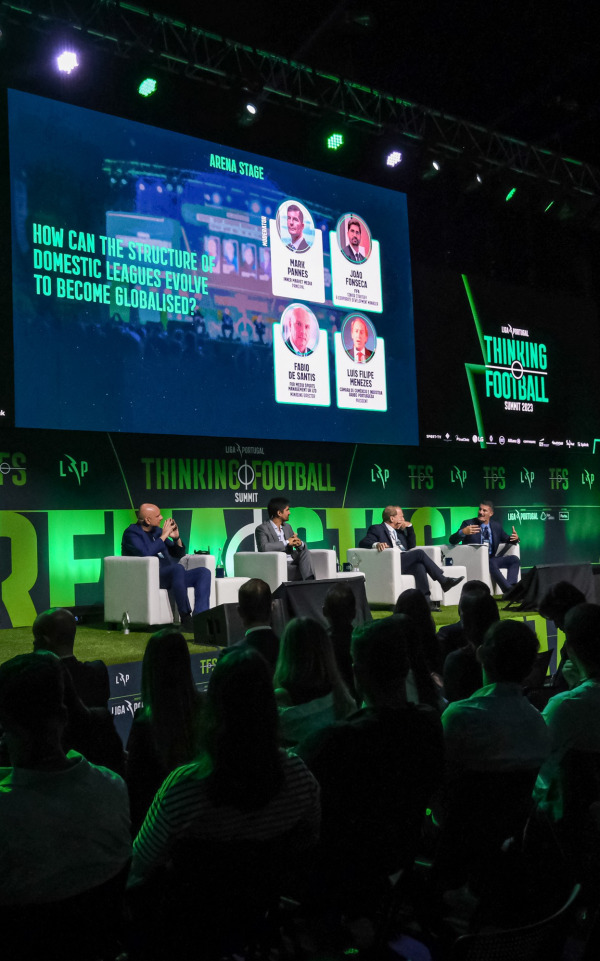The internationalisation of domestic leagues discussed on the Arena Stage

The internationalisation of domestic leagues discussed on the Arena Stage
João Fonseca, Fábio De Santis and Luís Filipe Menezes shared their insights and opinions on the final day of the Thinking Football Summit.
The football industry is more global than ever. To discuss how domestic leagues should seize this opportunity, the Arena Stage welcomed João Fonseca (Senior Strategy and Development Manager at FIFA), Fábio De Santis (Managing Director at For Media Sports Management UK Ltd) and Luís Filipe Menezes (President of the Arab-Portuguese Chamber of Commerce and Industry).
João Fonseca began by saying that, these days, football and its leagues are not only competing "against other leagues or other sports, but also against Netflix or Spotify". He then highlighted what he considers to be the main advantages of Liga Portugal. "Liga Portugal has defined Talent as its brand and I fully agree. But I add passion, which differentiates Portugal from China or the United States, and knowledge. You have to be qualified to do your best. And that is differentiating the Portuguese market."
"Financial sustainability is key in any industry. We in Portugal have a small market. It's easy to realise that our chances of growth lie abroad. In terms of the centralisation of audiovisual rights, we're 20 or 30 years behind. We're losing money. But there are positives in this. We can learn about how other leagues have implemented this centralisation and their mistakes. We have no excuse for doing it wrong," he added, also emphasising the importance of "economic control". "If I'm giving clubs more money and they spend it all on wages, we're not generating sustainability. This is one of the key tools for maximising the level."
For his part, Fabio De Santis emphasised the need to retain talent. "If you're a salesman, you're selling your talent and you can't keep the stars. It's a problem for Portugal. Players stay for a year or two, become stars and then have to leave. Saudi Arabia, for example, nobody knew there was a football league there until two years ago. People want to see the players, the stars," he said, also focusing on the centralisation of audiovisual rights. "With centralisation you make the league better. There's a better distribution of revenue and you sell the product better abroad."
Luís Filipe Menezes, on the other hand, believes that the leagues need to work on internationalisation, but that bodies like UEFA also have a key role to play. "What each league can do is important, but nothing absolutely decisive. Investing in training, recreating the organisational model for competitions, changing the funding model for TV rights... But levelling the playing field is much more in the hands of supranational bodies. I would say that UEFA's role in the competitive sustainability of the different leagues is more important than what we can do internally," he said, putting the onus on issues such as UEFA's scoring system.
News
Historic: Women's football clubs surpass €100 Million in revenue
For the first time ever, the combined revenue of top women’s football clubs in key markets has exceeded ...
How to succeed in the Sports Industry? Four tips from Rafael Nadal
Rafael Nadal is renowned for his excellence, determination, and relentless pursuit of victory. With 22 Grand Slam ...
Al-Nassr signs Esports player for record-breaking fee
João Afonso, world champion in FIFA and EA Sports FC, known as "Jafonso," has made history with the most ...
Is Netflix prepared to stream major sporting events? Insights from the Jake Paul vs. Mike Tyson fight
The live broadcast of the Jake Paul vs. Mike Tyson boxing match on Netflix marked a significant step for the platform, ...
European Leagues and FIFPro vs. FIFA: Lawyer Gonçalo Almeida explains the complaint to the European Commission
The European Leagues, chaired by Pedro Proença, along with FIFPro, has filed a complaint with the European ...
